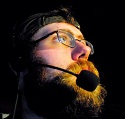I'm still mulling over an incident from this weekend. Not gun related, no injuries to anyone, but a lesson in mindset for sure.
Thought it would be worth sharing. Would like to hear your comments about how you can train others to REACT instead of freeze.
We were at a pool party at a neighbors house on Friday night (yes, it's already swim temps in TX). The kids were all swimming, the adults chatting and eating ~25 feet away. I hear a loud voice that I recognize as one of mine, kid #1. One kid yelling at another to STOP doing something. I look up to see another kid (the "other kid") with an arm around my kid #2's neck. Kid #2 is under the water and kid #1 is yelling STOP. I immediately intervened. Turns out that the other kid and my kid #2 were splashing around (equally, from all accounts) and the other kid got mad and went on the offensive. This other kid has known behavior issues and my kids are aware (not aware enough, apparently) that they need to handle interactions with this other kid differently.
We had a long talk over the weekend about taking action in urgent situations when words are failing, and about the difference between using physical force to intervene in a dangerous situation when words fail vs. "fighting".
What disturbed me (still) is this.....
My kid #1, and several other kids (by the time I intervened it was clear the situation was serious and other kids had begun yelling) did nothing more than yell STOP. How do you teach kids (or adults) that in some situations words will never be adequate, and action, immediate action is necessary?
My kid #2, after some discussion, said that they didn't want to fight back because they didn't want to hurt anyone. It seemed to me that it was more "not knowing what to do, so doing nothing". How do you teach/train kids/adults to properly assess a potentially life threatening situation and REACT (fight, flee...), not freeze.?
Are these innate skills or can they be trained?
How do you begin to train children for these skills?
How do you train adults? [Out of 8 adults only two were aware of the situation before the danger had ended, myself and one other]
Makes me shiver to think of what you can lose for the lack of ability to react properly and immediately to a dangerous situation.



 Reply With Quote
Reply With Quote





 I thought it WAS principally about kids!
I thought it WAS principally about kids! 
